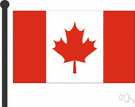Canadian
Also found in: Thesaurus, Medical, Financial, Acronyms, Idioms, Encyclopedia, Wikipedia.
Can·a·da
(kăn′ə-də) A country of northern North America. The original inhabitants of the region include the Inuit and First Nations. European colonists arrived in eastern Canada in the early 1600s, and the area was claimed by the French and then ceded (1763) to the English after the Seven Years' War. Confederation of the territories and provinces of British North America, which eventually included all land north of the United States, began in 1867 and ended with the addition of Newfoundland in 1949. The Statute of Westminster (1931) confirmed Canada's status as an independent Dominion within the Commonwealth. Ottawa is the capital and Toronto the largest city.
Ca·na′di·an (kə-nā′dē-ən) adj. & n.
Word History: Linguistically, mountains can be made out of molehills, so to speak: words denoting a small thing can, over time, come to denote something much larger. This is the case with Canada, now the name of the second-largest country in the world but having a much humbler origin. Apparently its history starts with the word kanata, which in Huron (an Iroquoian language of eastern Canada) meant "village." Jacques Cartier, the early French explorer, picked up the word and used it to refer to the land around his settlement, now part of Quebec City. By the 18th century it referred to all of New France, which extended from the St. Lawrence River to the Great Lakes and down into what is now the American Midwest. In 1759, the British conquered New France and used the name Quebec for the colony north of the St. Lawrence River, and Canada for the rest of the territory. Eventually, as the territory increased in size and the present arrangement of the provinces developed, Canada applied to all the land north of the United States and east of Alaska.
American Heritage® Dictionary of the English Language, Fifth Edition. Copyright © 2016 by Houghton Mifflin Harcourt Publishing Company. Published by Houghton Mifflin Harcourt Publishing Company. All rights reserved.
Canadian
(kəˈneɪdɪən)adj
(Placename) of or relating to Canada or its people
n
(Placename) a native, citizen, or inhabitant of Canada
Collins English Dictionary – Complete and Unabridged, 12th Edition 2014 © HarperCollins Publishers 1991, 1994, 1998, 2000, 2003, 2006, 2007, 2009, 2011, 2014
Ca•na•di•an
(kəˈneɪ di ən)adj.
1. of or pertaining to Canada or its inhabitants.
n. 2. a native or inhabitant of Canada.
[1560–70]
Random House Kernerman Webster's College Dictionary, © 2010 K Dictionaries Ltd. Copyright 2005, 1997, 1991 by Random House, Inc. All rights reserved.
ThesaurusAntonymsRelated WordsSynonymsLegend:
Switch to new thesaurus
| Noun | 1. |  Canadian - a native or inhabitant of Canada Canadian - a native or inhabitant of Canada Canada - a nation in northern North America; the French were the first Europeans to settle in mainland Canada; "the border between the United States and Canada is the longest unguarded border in the world" French Canadian - a Canadian descended from early French settlers and whose native language is French North American - a native or inhabitant of North America bluenose, Nova Scotian - a native or inhabitant of Nova Scotia Quebecois - a native or inhabitant of Quebec (especially one who speaks French) |
| 2. |  Canadian - a river rising in northeastern New Mexico and flowing eastward across the Texas panhandle to become a tributary of the Arkansas River in Oklahoma Canadian - a river rising in northeastern New Mexico and flowing eastward across the Texas panhandle to become a tributary of the Arkansas River in OklahomaLone-Star State, Texas, TX - the second largest state; located in southwestern United States on the Gulf of Mexico | |
| Adj. | 1. | Canadian - of or relating to Canada or its people |
Based on WordNet 3.0, Farlex clipart collection. © 2003-2012 Princeton University, Farlex Inc.
Translations
Kanaďankanadský
canadiercanadisk
kanada
kanadalainen
Kanađaninkanadski
kanadai
カナダのカナダ人
캐나다 사람캐나다의
KanadyjczykkanadyjskiKanadyjka
canadian
kanadensiskkanadensare
เกี่ยวกับประเทศแคนาดาชาวแคนาดา
канадецьканадієцьканадійськийканадський
người Canadathuộc nước/người Canada
Collins Spanish Dictionary - Complete and Unabridged 8th Edition 2005 © William Collins Sons & Co. Ltd. 1971, 1988 © HarperCollins Publishers 1992, 1993, 1996, 1997, 2000, 2003, 2005
Collins English/French Electronic Resource. © HarperCollins Publishers 2005
Collins German Dictionary – Complete and Unabridged 7th Edition 2005. © William Collins Sons & Co. Ltd. 1980 © HarperCollins Publishers 1991, 1997, 1999, 2004, 2005, 2007
Collins Italian Dictionary 1st Edition © HarperCollins Publishers 1995
Canadian
→ كَنَدِيّ Kanaďan, kanadský canadier, canadisk Kanadier, kanadisch καναδικός, Καναδός canadiense kanadalainen Canadien Kanađanin, kanadski canadese カナダの, カナダ人 캐나다 사람, 캐나다의 Canadees kanadier, kanadisk Kanadyjczyk, kanadyjski canadense, canadiano канадец, канадский kanadensare, kanadensisk เกี่ยวกับประเทศแคนาดา, ชาวแคนาดา Kanada, Kanadalı người Canada, thuộc nước/người Canada 加拿大人, 加拿大的Multilingual Translator © HarperCollins Publishers 2009
